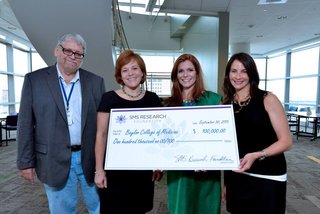SMS Research Foundation partners with Baylor College of Medicine

Baylor, Smith-Magenis Syndrome Research Foundation team up with $300,000 to advance research of complex syndrome
HOUSTON – (Sep. 30, 2013) – With new support from the Smith-Magenis Syndrome Research Foundation, Baylor College of Medicine will establish a new center focused on expanding research into this complex genomic disorder.
The center will be named the SMS Initiative sponsored by the SMS Research Foundation at BCM. The Foundation will contribute $300,000 over five years to establish a fellowship and research program.
The program will enable trainees (graduate students or postdoctoral fellows) to learn, develop and focus research efforts on Smith-Magenis syndrome, with special focus on the function and regulation of the RAI1 gene which has been associated with the disease.
Smith-Magenis syndrome is a genetic disability that affects many parts of the body. Individuals with the syndrome may have mild to moderate intellectual disability, delayed speech and language skills, distinctive facial features, obesity, sleep disturbance and behavioral problems.
“We are thrilled to have this new center that focuses on basic research targeted toward this complex syndrome. It will help to answer some very difficult questions, provide better understanding of the molecular pathology behind Smith-Magenis syndrome and we hope will lead to therapeutic interventions for individuals with this disorder,” said Dr. Sarah Elsea, associate professor of molecular and human genetics at BCM (http://www.bcm.edu/genetics/index.cfm?pmid=24519).
Elsea and Dr. James R. Lupski, the Cullen Professor and Vice Chair of Molecular Genetics at BCM, will help direct the program.
“The need for organizations such as the Smith-Magenis Syndrome Research Foundation to support the ever declining research funding base is incredibly important to advance our understanding of rare disease,” said Elsea. “We commend the efforts of the Foundation and appreciate the trust and confidence they have placed in us to push knowledge forward in this area.”
The funding provided over the next five years will support critical research efforts, will train the next generation of scientists about Smith-Magenis syndrome and intellectual disability, and will provide the necessary support to lead us to a higher level of understanding about the developmental effects of the genetic abnormalities that result in the disease and its association with other intellectual disability syndromes, Elsea said.
“This partnership is a huge milestone for the Foundation and for the research of Smith-Magenis syndrome,” said Missy Longman, president and co-founder of the SMS Research Foundation. “It is something we have been working towards since we started fundraising four years ago. We are thrilled. It is only the beginning of what we envision will become an aggressive pursuit of solutions that will improve the quality of the lives of everyone affected by SMS, directly and indirectly.”
“With this new funding and center, we will advance our understanding of the function of this important gene,” said Lupski. “This is critical to move toward appropriately targeted therapeutic intervention.”
We will also learn more about the mechanisms for Smith-Magenis syndrome and other genomic disorders due to copy number variation (CNV) in the human genome. Molecular and clinical studies of patients with Smith-Magenis syndrome at BCM and Texas Children’s Hospital have been at the forefront of research in genomic disorders for almost two decades, said Lupski.
The program was dedicated today with a special ceremony at BCM. See photos from the event on the BCM Facebook page.
Glenna Picton
713-798-4710

